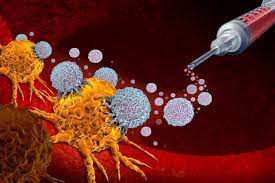Prostate Cancer Vaccine Extends Survival
By wchung | 07 Sep, 2025
An experimental treatment added four months to the lives of men with advanced prostate cancer in a study that tested an entirely new approach to fighting the disease, doctors reported Tuesday.
Dendreon Corp.‘s Provenge vaccine trains the immune system to fight tumors. It’s called a “vaccine” even though it treats disease rather than prevents it.
Doctors have been trying to develop such a therapy for decades, and this is the first to meet a preset goal for improving survival in late-stage testing.
“There have been a lot of false starts, but this is a real start,” said Dr. Paul Schellhammer, a urologist at Eastern Virginia Medical School in Norfolk, Va., who led the study. Results were reported Tuesday at an American Urological Association conference in Chicago.
Seattle-based Dendreon paid for the study, and Schellhammer owns stock in the company. Dendreon shares fell sharply, and then trading was halted leading up to the release of the data. Shares fell $9.74, or 45.2 percent, to $11.81. The reason was not immediately clear.
Four months may not sound like a lot, but it is longer than the three months afforded by Taxotere, the only chemotherapy approved for men in this situation. Doctors hope for even greater benefit if they give the drug earlier in the course of the disease. Dendreon would give no cost estimate for Provenge, but other such biotech drugs cost several thousand dollars a month.
It remains to be seen if side effects will keep Provenge from winning federal Food and Drug Administration approval. Two years ago, the FDA went against its advisers and delayed a decision, asking for more proof of safety and effectiveness.
The new study involved 521 men whose cancer had spread and wasn’t responding to standard hormone treatments. Two-thirds were given Provenge, a treatment that is customized for each patient.
Doctors collect special blood cells from each patient that help the immune system recognize cancer as a threat. They are mixed with a protein found on most prostate cancer cells and another substance to rev up the immune system. The resulting “vaccine” is given back to the patient as three infusions two weeks apart.
The other one-third of men in the study had a dummy infusion.
Median survival was 26 months in men given Provenge and 22 months in the others. Three-year survival rates were 32 percent for the Provenge group and 23 percent for the others — a 38 percent improvement.
Strokes and other brain-related problems were no more common with Provenge — a worry raised by earlier studies. However, four men given Provenge suffered lung clots, though none were fatal. High blood pressure was twice as common with Provenge. Overall, the rate of serious side effects was the same in each group.
Improving survival “is the gold standard” for any treatment, and Provenge appears to do that, said Dr. Ira Sharlip, a urologist from the University of California in San Francisco and a spokesman for the urological association.
Dr. Otis Brawley, the American Cancer Society’s chief medical officer, said the FDA had been right to ask for more study. Seeing the new results, he said, “I would vote for approval” as long as it didn’t harm men’s quality of life.
One patient said it did not hurt his. Thomas Robbins, 74, of Forest City, N.C., was diagnosed in 2002 with prostate cancer that was growing despite hormone treatment.
“They wanted to give me chemo,” but he feared its side effects and enrolled in the Provenge study instead. He learned afterward that he had been one of those given the vaccine.
“Did it help me? I can’t 100 percent guarantee, but I think it did,” he said.
Advocacy groups cheered the results. Scott Riccio, founder of Accelerate Progress, called them “compelling.”
“For the first time, we have real clinical validation that cancer can be fought by stimulating the body’s immune system,” he said in a statement. “Hundreds of thousands of men fighting prostate cancer will now have real hope that a safe and effective new option will be available to them in their fight for life.”
Thomas Farrington, a prostate cancer survivor and founder of the Prostate Health Education Network, said: “Prostate cancer patients finally have hope for a better life. We are in desperate need of groundbreaking new treatments like Provenge.”
Prostate cancer is the most common non-skin cancer in American men. An estimated 186,000 new cases and 28,660 deaths from it occurred last year.
4/28/2009 2:59 PM MARILYNN MARCHIONE AP Medical Writer CHICAGO

Asian American Success Stories
- The 130 Most Inspiring Asian Americans of All Time
- 12 Most Brilliant Asian Americans
- Greatest Asian American War Heroes
- Asian American Digital Pioneers
- New Asian American Imagemakers
- Asian American Innovators
- The 20 Most Inspiring Asian Sports Stars
- 5 Most Daring Asian Americans
- Surprising Superstars
- TV’s Hottest Asians
- 100 Greatest Asian American Entrepreneurs
- Asian American Wonder Women
- Greatest Asian American Rags-to-Riches Stories
- Notable Asian American Professionals

